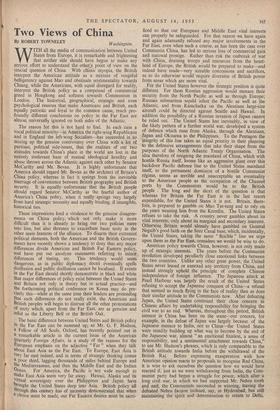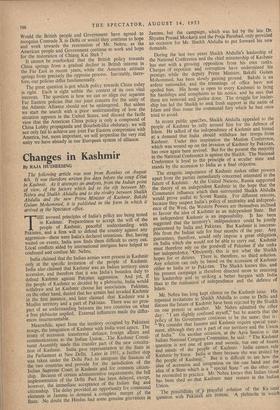Two Views of China
WITH all the media of communication between United States from Europe, it is remarkable and frightening that neither side should have begun to make any serious effort to understand the other's point of view on the crucial question of China. With classic myopia, the British interpret the American attitude as a mixture of vengeful belligerency against Mao and obstinate sentimentality towards Chiang, while the Americans, with equal disregard for reality, interpret the British policy as a compound of commercial greed in Hongkong and softness towards Communism in London. The historical, geographical, strategic and even psychological reasons that-make Americans and British, each equally patriotic and loyal to the common cause, reach pro- foundly different conclusions on policy in the Far East are almost universally ignored on both sides of the Atlantic.
The reason for this is not hard to find. In each case a vocal political minority—in America the right-wing Republicans and in England the left-wing Socialists—has succeeded in so mixing up the genuine controversy over China with a lot of partisan, political side-issues, that the realities of our two attitudes towards China's place in the world are lost in the entirely irrelevant haze of mutual ideological hostility and abuse thrown across the Atlantic against each other by Senator McCarthy and Mr. Bevan. It is highly unfortunate that America should regard 'Mr. Bevan as the architect of Britain's China policy, whereas in fact it springs from the inevitable marriage of convenience between British geography and British security. It is equally unfortunate that the British people should regard Senator McCarthy as the fearful author of America's China policy, when it really springs very largely from hard strategic necessity and equally binding, if intangible, historical ties.
These impressions lend a virulence to the genuine disagree- ments on China policy, which not only make it more difficult than it is already to bring our two policies more into line, but also threaten to exacerbate basic unity in the other main features of the alliance. To disarm their extremist political elements, both the American and the British Govern- ments have recently shown a tendency to deny that any major differences divide American and British Far Eastern policy, and have put out anodyne statements referring to minor differences of timing, etc. This tendency would seem dangerous, as in public diplomacy deceit eventually spells disillusion and public disillusion cannot be localised. If events in the Far East should shortly demonstrate in black and white that major differences of policy exist between the United States and Britain not only in theory but in actual practice—and the forthcoming political conference on Korea may do pre- cisely this—while at the same time their leaders are pretending that such differences do not really exist, the American and British peoples will begin to distrust all the other protestations of unity which, apart from the Far East, are as genuine and solid as the Liberty Bell or the British Oak.
The basic difference between United States and British policy in the Far East can be summed up, as Mr. G. F. Hudson, a Fellow of All Souls, Oxford, has recently pointed out in a remarkable article in the current issue of the American quarterly Foreign Affairs, in a study ,of the reasons for the European emphasis on the adjective ' Far " when they talk about East Asia as the Far East. To Europe, East Asia is very far east indeed, and in terms of strategic thinking comes a poor third, lagging thousands of miles behind Europe and the Mediterranean, and then the Middle East and the Indian Ocean. For America, the Pacific is not wide enough to Make East Asia seem very far away. Hawaii, Alaska and its virtual sovereignty over the Philippines and Japan have brought the United States deep into Asia. British policy all through this century has of necessity demonstrated that when a choice must be made, our Far Eastern desires must be sacri- ficed so that. our European and Middle East vital interests can properly be safeguarded. For that reason we have again and again adamantly refused any major involvements in the Far East, even when such a course, as has been the case over Communist China, has led to serious loss, of commercial gain and national prestige. Rather than risk the outbreak of war . with China, draining troops and resources from the heart- land of Europe, the British would be prepared to make—and indeed have made—very sizeable concessions and sacrifices, as to do otherwise- would require diversion of British power from areas which are more vital. . For the United States however the strategic position is quite different. For them Russian aggression would menace their security from the North Pacific as well as through Europe; Russian submarines,would infest the Pacific as well as the Atlantic, and from Kamchatka on the Aleutians large-size aircraft could be directed against Seattle and Hawaii. In addition the possibility of a Russian invasion of Japan cannot be ruled out The United States has inevitably, in view of the likely pattern of a further world war, developed a system of defence which runs from Alaska, through the Aleutians, Japan and Okinawa to the Philippines. To the Pentagon the integrity of this line takes an equal priority in their planning to the defensive arrangements that take their shape from the purposes of the North Atlantic Treaty Organisation. The idea therefore of resigning the mainland of China, which with hostile Russia itself, looms like an aggressive giant over this backdoor Pacific defence line to the United States mainland itself, to the permanent dominion of a hostile Communist regime, seems as terrible and unacceptable an eventuality to the American people as the occupation of the Channel ports by the Communists would be to the British people . The long and the short of the question is that whereas for Britain the Far East is in the last resort expendable, for the United States it is not. Britain, there- fore, is prepared to gamble on Mao Tse-tung and to rely on the years weaning him from the Kremlin. The United States refuses to take the risk. A country never gambles about its vital interests; only about its marginal and secondary interests. Otherwise Britain would already have gambled on General Neguib's good faith on the Suez Canal base, which, incidentally, the United States, taking the same " flexible " line we urge upon.them in the Far -East, considers we would be wise to do.
American policy towards China, however, is not only made up of strategic interests. The years before the Communist revolution developed peculiarly close emotional links between the two countries. Unlike any other great power, the United States never leased. or annexed any territory from China, and instead strongly upheld the principle of complete Chinese independence of foreign influence. The Japanese attack at Pearl Harbour was largely the result of the United States refusing to accept the Japanese conquest of China—a refusal that seemed as much flying in the face of reality then as does their similar attitude to the Communists now. After defeating Japan, the United States continued their close concern in Chinese affairs by undertaking responsibility for bringing the civil war to an end. Whereas, throughout this period, British interest in China has been on the wane—our concern, for example, in the defeat of Japan was largely because, of the Japanese menace to India, not to China—the United States were steadily building up what was to become by the end of the Japanese war, almost " an emotional fixation, a sense of responsibility, and a sentimental attachment towards China," to use Mr. Hudson's phrases, which is only comparable to the British attitude towards India before the withdrawal of the British Raj. Before expressing exasperation with how American opinion reacts to proposals to recognise Red China, it is wise to ask ourselves the question how we would have reacted if, just as we were withdrawing from India, the Com- munist party had begun a struggle for power, which after a long civil war, in which we had supported Mr. Nehru tooth and nail, the Communists succeeded in winning, leaving the defeated Nehru faction isolated, say, in Hyderabad, but still maintaining the spirit and determination to return to Delhi. Would the British people and Government have agreed to recognise Comrade X in Delhi or would they continue to hope and work towards the restoration of Mr. Nehru, as the American people and Government continue to work and hope for the restoration of Chiang Kai Shek ?
It cannot be overlooked that the British policy towards China springs from a gradual decline in British interest in the Far East in recent years, while the American attitude springs from precisely the opposite process. Inevitably, there- fore, our policies differ fundamentally.
The great question is.pot which policy towards China today is right. Each is right within the context of its own vital interests. The question is how we can so align our separate Far Eastern policies that our joint concern for the unity of the Atlantic Alliance should not be endangered. But unless we start the search with a prior understanding of how the situation appears in the United States, and discard the facile view that the American China policy is only a compound of China Lobby propaganda and Bourbon-like obduracy, we will not only fail to achieve any joint Far Eastern compromise with America, but, more important, we will jeopardise the very real unity we have already in our European system of alliance.



































 Previous page
Previous page